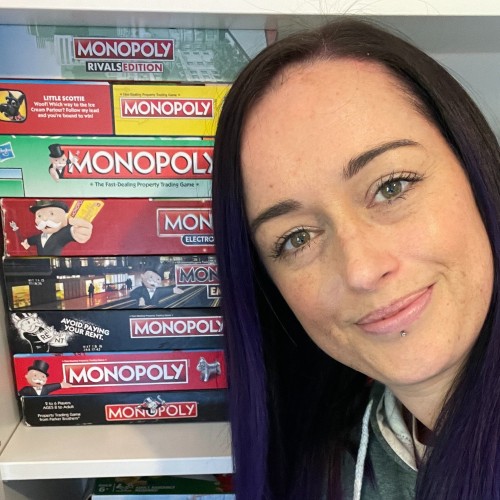Chance and Community Chest Cards are one of the best parts of the game of Monopoly and I love how they throw a bit of jeopardy into proceedings.
Some are good, some are bad, but I think we can all agree that one of the worst is the Street Repairs card!
Let’s have a look at what this card means and what you have to do if you’re unlucky enough to draw it.
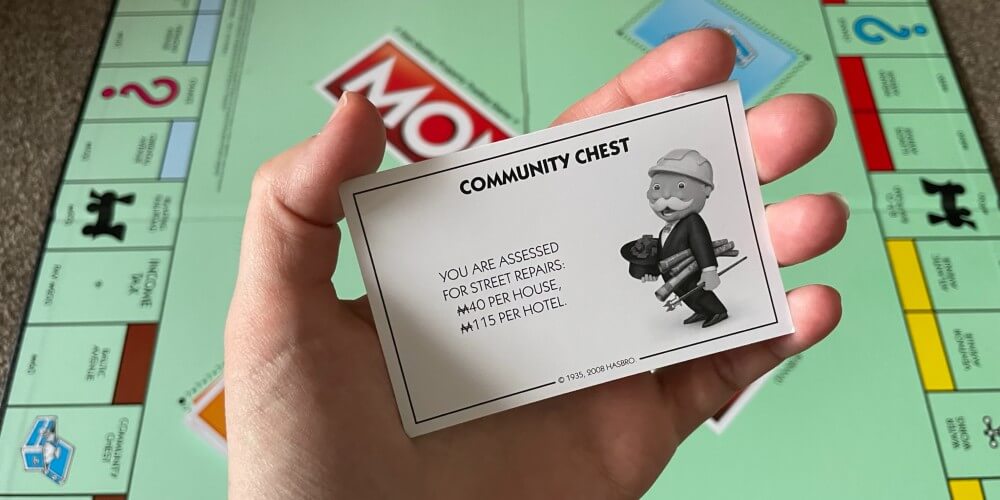
What’s the meaning of “You Are Assessed For Street Repairs”?
When you are ‘assessed for street repairs’ in Monopoly, it means that you have to pay a fee for repairs to each of the houses and hotels that you own. You will be charged $40 for each house and $115 per hotel.
Drawing the Community Chest card that has street repairs can prove to be very expensive if you have lots of buildings on your properties, making it the worst possible card you can pull from the pack.
There is also a Chance Card that is very similar and will see you lose out financially for ‘general repairs’ to your properties. This version of the card is slightly less costly as it requires you to pay only $25 for each house and $100 for each hotel that you own.
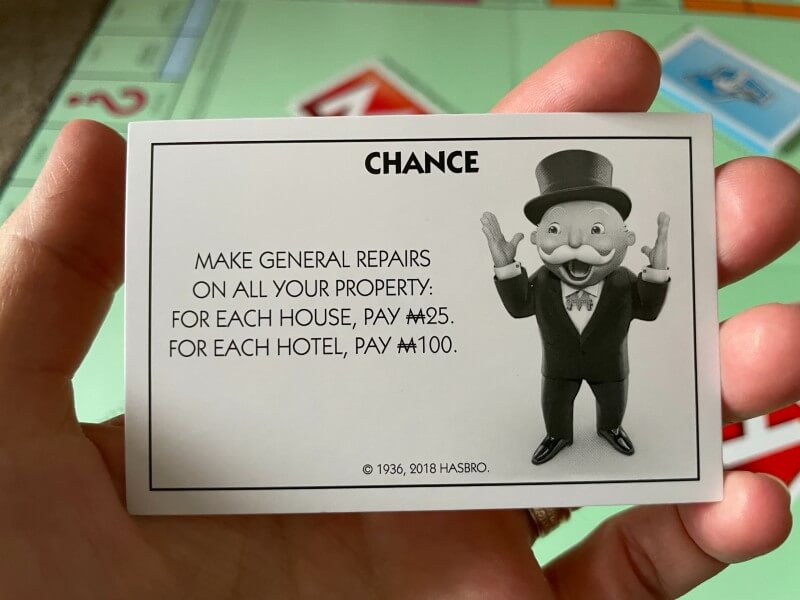
Here are the words on the two cards:
- Community Chest: You are assessed for street repairs. $40 per house. $115 per hotel.
- Chance: Make general repairs on all your property. For each house pay $25. For each hotel pay $100.
How Does Street Repairs Work In Monopoly?
The street repairs card in Monopoly is fairly straightforward. The more houses and hotels you own, the more you will have to pay. If you are unlucky enough to pick up the street repairs card you will have to pay $40 for each house that you own and $115 for each hotel that you own.
This means that the maximum total repair bill could be as high as $2,660 if you owned all 12 hotels and all 32 houses in the game!
If you landed on Boardwalk with a hotel on it you would have to pay $2,000. So, Community Chest could be the worst possible square to land on, in terms of the potential loss.
Where does Street Repairs money go?
The cash you pay for street repairs in Monopoly should go to the bank. Some players like to place fines like this in the middle of the board and collect them if they land on Free Parking. However, this is an unofficial House Rule and not part of the official Monopoly rules.
I don’t recommend that you save the cash from any bills or fines for Free Parking. Doing so means that there will be an abundance of cash in the game, making it harder to make anyone bankrupt. This can cause the game to drag on for much longer than it should do to reach a conclusion.
Suggested read: 16 Little-known Monopoly Rules That Everyone Gets Wrong
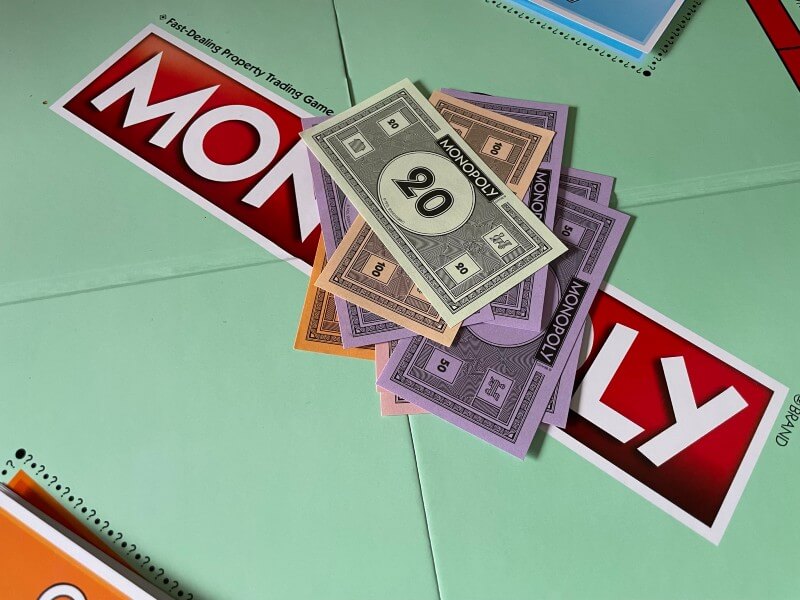
Do I have to pay for street repairs on every building?
Over the long history of Monopoly, some people have been confused over the wording of the street repairs card. Unlike, the similar Chance Card, the street repairs card doesn’t specifically state that the fee is to be paid on property that you own.
This has led some people to speculate that you should be paying this fee for every building on the board. whether you own it or the opposing players own it.
This is not the case. If you have to pay for street repairs it is only payable on houses and hotels that you own.
This has been confirmed in a FAQ insert that is included with some editions of Monopoly.
In newer editions of Monopoly, working on the card has been adjusted to include the words ‘YOU OWN’ to clarify that you don’t have to pay for everyone else’s street repairs, just yours.
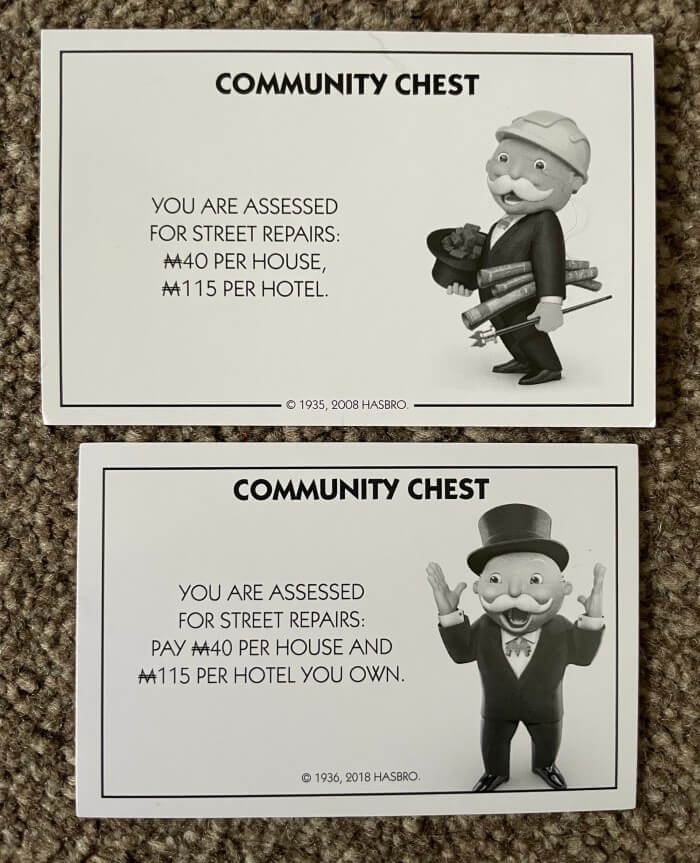
Can you sell buildings to pay for street repairs?
Disaster! You pick up the dreaded street repairs card when you’re low on cash and you don’t have enough money to pay your street repair bill.
You have no properties without buildings to mortgage, so what do you do? Can you sell a building to pay for the repairs on that building? Does that make sense? Surely you wouldn’t sell a house to pay for repairs on a house?
Well, the answer is yes you can do this in the game of Monopoly. Hotels and houses can be sold at any time for half of their purchase price.
So, if you need to, you can sell some of your houses or hotels to pay the street repairs bill. But you must still pay the full street repairs cost on the total amount of houses that you had when you picked up the card.
This does make sense if you think about it. You have to find a way to pay for a bill that you owe. To avoid going bankrupt, you sell whatever assets you have, even if it’s the same asset that incurred the cost.
This could happen in real life too. If a property developer renovates a house but discovers a hidden damp problem that causes them to go over budget, they may end up having to sell the house to avoid bankruptcy.
No more street repairs!
I have spent a bit of time here explaining the street repairs rule and why you really don’t want to be picking up this card. So, you will probably be pleased to hear that new editions of Monopoly do not have the street repairs card! Hooray!
Sadly, it is not all good news. Monopoly has replaced the street repairs card with a new Community Chest card that has exactly the same impact as the old card, just slightly different wording. You still have to pay $40 for every house that you own and $115 for each hotel that you own.
However, it has at least clarified that it’s only your own properties that need to be paid for, so it has removed that possible area of confusion.
Here is the new card wording. I think that it is actually a bit meaner by suggesting that it is your fault for not volunteering!
“You should have volunteered for that home improvement project – you would have learned valuable skills! FOR EACH HOUSE YOU OWN, PAY $40. FOR EACH HOTEL YOU OWN, PAY $115.”
What Happens If You Can’t Afford Street Repairs?
If you are unable to pay for the street repairs from your cash reserves then you will have to look at what assets you have that you could sell.
The good news is that if this card is affecting you, it means that you do actually have some assets. So, there’s a good chance that you will be able to find a way to pay your bill.
When you run out of cash you can raise money by mortgaging properties, selling houses and hotels to the bank, or trading with other players for cash. So, there are a few options.
Houses and Hotels sell for half of what you paid for them. The same is generally true when you mortgage properties.
It is also possible to trade properties with other players. This includes trading for cash, so you might be able to get more than the mortgage value for a property if your opponent needs it to complete a set.
There is no set value for a Get Out of Jail Free card, you just have to see if anyone else is willing to buy it from you. Paying to get out of jail only costs $50, but someone might give you a few bucks for a card.
If after doing all of this, you still can’t pay for the street repairs then you will, sadly, be out of the game as per the bankruptcy rules.
The Bottom Line
Now you should know all that you could ever want to know about street repairs in Monopoly.
Obviously, it is not a great card to be picked up during the game. A carefully crafted, near-winning position, can quickly unravel if you need to pay repairs for loads of hotels and houses. You could end up paying over $2,000 for a repair bill that could see your fortune dwindle dramatically.
But, that’s what’s so good about this card – it helps to keep the game balanced and gives the players that are behind some hope that they may be able to claw their way back into the game.
Of course, if you don’t like it, you could always make your own Chance & Community Chest cards.

